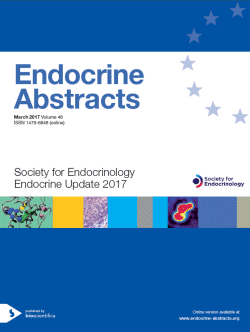Obesity Update
Poster Presentations
ea0048p1 | Poster Presentations | SFEEU2017
Weight loss and associated improvements in cardiometabolic risk factors with liraglutide 3.0 mg in the SCALE Obesity and Prediabetes randomised, double-blind, placebo-controlled 3-year trial
McGowan Barbara , Fujioka Ken , Greenway Frank , Krempf Michel , Le Roux Carel , Vettor Roberto , Lilleore Soren , Astrup Arne
ea0048p2 | Poster Presentations | SFEEU2017
Effect of increased endogenous glucose levels within Type 2 diabetes on cellular lipid profiles
Churm Rachel , Barry John , Caplin Scott , Davies Jeffrey , Stephens Jeffrey , Prior Sarah
ea0048p3 | Poster Presentations | SFEEU2017
Hyperinsulinemic hypoglycaemia after bariatric surgery: Is it commoner than anticipated?
Al-Sharefi Ahmed , Arutchelvam Vijayaraman
ea0048p4 | Poster Presentations | SFEEU2017
Night-blindness and neurological sequelae post bariatric surgery
Iftikhar Mawara , Waller Kathryn , Crane James , McGowan Barbara
ea0048p5 | Poster Presentations | SFEEU2017
Oral glucose tolerance test should be selectively performed to confirm reactive hypoglycaemia in post-bariatric surgery patients
Lim Jonathan ZM , Thomas Cecil
ea0048p6 | Poster Presentations | SFEEU2017
Review of process of care for bariatric surgery in a specialist weight management centre
Elkhenini Hanaa , Slater Chris , Ammori Basil , Akhtar Khurshid , Senapati Siba , Summers Lucinda , New John Syed Akheel , Ammori Basil , Summers Lucinda , Syed Akheel , New John
ea0048p7 | Poster Presentations | SFEEU2017
Setting a weight loss or clothes size goal following laparoscopic adjustable gastric banding: Does this impact on outcomes?
Hancock Jude , Jackson Sue , Johnson Andrew
ea0048p8 | Poster Presentations | SFEEU2017
Perioperative nutritional status, supplementation and monitoring in patients referred for bariatric surgery: Closing the audit loop
Prankerd-Smith Olivia , Shotliff Matthew , Zalin Anjali , Morganstein Daniel , Shotliff Kevin , Edmiston Kelli , Davison Nuala , Ashrafian Hutan , Efthimiou Evangelos , Greener Veronica
ea0048p9 | Poster Presentations | SFEEU2017
Comparison of the impact of Roux-en-Y gastric bypass and sleeve gastrectomy on 2-year post-operative glycaemic outcomes in people with type 2 diabetes: the role of weight-loss
Pucci Andrea , Makaronidis Janine , Cheung Wui-Hang , Jenkinson Andrew , Adamo Marco , Elkalaawy Mohamed , Tymoszuk Urszula , Hashemi Majid , Finer Nicholas , Batterham Rachel
ea0048p10 | Poster Presentations | SFEEU2017
Change in body mass index (BMI) after highly active antiretroviral therapy among hiv patients in kano, Northwestern Nigeria
Muhammad Fakhraddeen , Ramalan Mansur , Enikuomehin Adenike
ea0048p11 | Poster Presentations | SFEEU2017
Reduction in the risk of developing type 2 diabetes (T2D) with liraglutide 3.0 mg in people with prediabetes from the SCALE Obesity and Prediabetes randomised, double-blind, placebo-controlled trial
McGowan Barbara , Roux Carel Le , Astrup Arne , Fujioka Ken , Greenway Frank , Lau David , Van Gaal Luc , Ortiz Rafael Violante , Wilding John , Skjoth Trine , Pi-Sunyer Xavier
ea0048p12 | Poster Presentations | SFEEU2017
Role of peri-operative psychiatric assessment and intervention in managing the obese patient presenting for bariatric surgery: A complex case of post-bariatric surgery addiction transfer
Mohamed Isra Ahmed , Waller Kathryn , McGowan Barbara
ea0048p13 | Poster Presentations | SFEEU2017
Insulin and glucose homeostasis 5 years after bariatric surgery
Min Thinzar , Barry Jonathan , Caplin Scott , Stephens Jeffrey
ea0048p14 | Poster Presentations | SFEEU2017
Clinical outcomes of bariatric surgery in a specialist centre
Elkhenini Hanaa , Slater Chris , Ammori Basil , Ammori Basil , Akhtar Khurshid , Senapati Siba , Summers Lucinda , Summers Lucinda , New John , New John , Syed Akheel Syed Akheel




